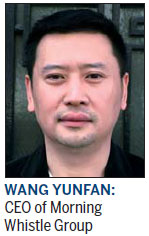Goals may need revision
Updated: 2016-06-17 08:29
By Angus McNeice(China Daily Europe)
|
|||||||||
Observers or meddlers?
However, the heavy investment in European football by Chinese companies has caused concern among fans about what the money will mean for the future of the beautiful game on the continent.
Examples of foreign owners meddling in player transfers, on-field tactics and even club traditions have frequently made headlines over the past decade, such as Malaysian businessman Vincent Tan's attempt to boost Cardiff City FC's global appeal by changing the team's home jersey from blue to red and replacing the crest's bluebird with a dragon.
Russian billionaire Roman Abramovich, the owner of Premier League club Chelsea since 2003, was in the early years accused by the media of meddling in team selection and tactics.

A Chinese investor has already made a faux pas in Portugal. In January, LED light manufacturer Ledman, which has a sponsorship deal with the country's second division, sparked outrage when it insisted that Chinese players feature in the clubs' starting lineups. The company quickly backtracked, but it opened up the question whether Chinese investors plan to adopt an interventionist approach or will purely act as financial backers.
Lin Feng, CEO of DealGlobe, the platform that facilitated the MP & Silva deal, describes Chinese investors as passive. "They're not really going to be actively involved in the day-to-day running of clubs, and I think that's important. The Chinese invest money and resources rather than actually manage the club," he says.
"For example, Chinese buyers are clear that they don't know the football market in Britain that well - many of them don't speak English, so for them to manage a company in a very active role would be difficult. For all Chinese buyers, their view from a financial perspective is to back the club and, at the same time, add strong value from China and Asia. As for the operation of clubs in Europe and Britain, they will let the management team handle it."
Simon Chadwick, a professor of sport business strategy at Salford University, believes on the whole that Chinese investors are not in search of vanity projects but rather are facing a steep learning curve as they contribute to President Xi Jinping's plan to establish China as a football superpower.
"The way I would rationalize this is that if you were a Chinese businessman or woman, you're not buying a football club, you're buying into football, and I think there is a subtle difference there because although you may be the legal owner, fans will always see you as sharing your ownership with them. As a consequence, you have to be more sensitive in the way you go about your business.
"In fairness to Ledman in the Portugal case, (the company) didn't understand the sensitivities around what it was trying, and as soon as the backlash took place it didn't fight head-on - it took a step back and acknowledged that this is an industry like no other, in the sense that you've got to defer sometimes to the history, the heritage, the sociocultural influences of football."
In frank terms, Feng offered his own reassurances. "There is an old saying in China that business is business, so profit is priority. In terms of cultural conflicts between (Chinese) owners and clubs and fans, that will be minimized," he says. "After all, the involvement of Chinese companies will mainly be on a capital operational level."
Cecily Liu contributed to this story.
angus@mail.chinadailyuk.com
Today's Top News
Germany, France, Italy urge Britain not to waste time in divorcing EU
Britain urged not to waste time in divorcing EU
Turkey's Erdogan apologizes to Putin
UK opposition leader Corbyn says will not resign
10 hurt in rollercoaster accident in central Scotland
Vote poses China-UK trade ties challenge
China respects Brexit decision
UK vote blows the whole European plan wide open
Hot Topics
Lunar probe , China growth forecasts, Emission rules get tougher, China seen through 'colored lens', International board,
Editor's Picks

|

|

|

|

|

|







